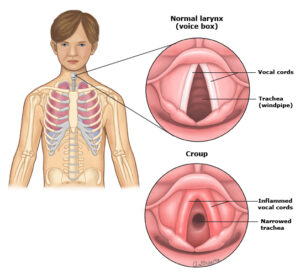By: Leslie Gallon, MSN, APRN, CPNP-PC
‘Tis the season for respiratory viruses…RSV, flu, and croup (just to name a few). The weather is changing, germs are spreading, and now your little one has a cold. He or she went to bed fine but woke up in the middle of the night with a barking, seal-like cough. Chances are your little one has developed croup.
Croup is a respiratory illness caused by inflammation and narrowing of the upper airway including the larynx and trachea.

UptoDate.com – Croup, Beyond the Basics
While a variety of viruses may cause croup, the parainfluenza virus is the most common offending agent. Croup is typically spread through droplets such as coughing or sneezing from another person that has the virus. It is a self-limiting illness that may occur year round but is more commonly seen during the fall and winter. Croup is most problematic between the ages of six months to three years. After the age of three, the chances of developing croup decreases due to the child’s windpipe becoming larger.
Classic symptoms of croup include:
- Barking, seal like cough
- Stridor – harsh, high pitched sound when breathing in that may be present at rest but often worst with activities, when crying, or upset
- Fever
- Difficulty breathing – rapid, shallow breathing or retractions
- Hoarseness – raspy or strained voice
- Nasal congestion/runny nose
The treatment for croup depends on the severity of the illness: in most cases treatment can be managed at home. Less than 5% of cases will require a hospital based treatment.
Mild symptoms: croupy cough but no difficulty breathing
- Taking your child into a steamy bathroom with the door closed for about 15-20 minutes.
- Going outside into the cool, nighttime air or standing in front of the freezer with the door open may help open up the airway allowing the child to breathe better.
- Honey, for children older than 1 year of age may be helpful and is typically the only recommended intervention for cough for children less than 6 years of age.
- Encourage plenty of fluids and rest.
- Cool mist humidifiers help moisten the air.
- Ibuprofen and/or Acetaminophen can help with inflammation causing symptoms as well as fever and ‘the feel bads’.
- Keeping them as calm as possible, as symptoms may worsen with agitation and activities.
Moderate symptoms: breathing hard or faster than normal, intermittent stridor, persistent or worsening barky cough; they require evaluation at the doctors office
- A one-time dose of an oral steroid called Dexamthasone may be given orally or by injection. This medication helps reduce swelling of the airway and overall helps improve breathing. A single dose usually lasts 24-36 hours, long enough to treat symptoms until the body gets rid of the virus causing them.
Severe symptoms: persistent stridor at rest, drooling, difficulty breathing, breathing harder or faster; they should be seen in the emergency department right away
- Racemic Epinephrine is a rapid onset nebulizer treatment used for immediate symptom relief in severe cases of croup. It helps reduce stridor and the work of breathing by decreasing airway swelling. This medication is used only in a clinical setting; it is not a prescription.
- These children will also receive the steroid medications mentioned above
Croup can be frightening for you and your child but it is important to stay calm and get your child to the right treatment location based on their symptoms. Hopefully this information helps you feel more prepared if your child develops croup.
POPNOW, the new same-day sick visit service at Potomac Pediatrics has all of the medications listed above and is staffed by experienced urgent care and emergency department providers who are well equipped to treat your child’s Croup. If you have further questions, reach out to your provider at Potomac Pediatrics or a member of our triage team (advicenurse@potomacpediatrics.com)







